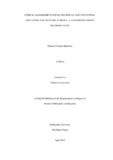
Please use this identifier to cite or link to this item:
https://hdl.handle.net/20.500.14301/246| Title: | Ethical Leadership in Nepali Technical and Vocational Education and Training Schools: A Convergent Mixed Methods Study |
| Authors: | Bhattarai, Prakash Chandra |
| Citation: | Bhattarai,P.C.(2015).Ethical leadership in Nepali technical and vocational education and training schools: A convergent mixed methods study. |
| Issue Date: | Apr-2015 |
| School: | SOED |
| Department: | DODE |
| Level: | Ph.D. |
| Program: | PhD in Development Education |
| Abstract: | The study of ethical leadership is very important to cultivate professional practices and integrity in schools and their principals. This concern is particularly imperative to the principals of the Technical and Vocational Education and Training (TVET) sector, where there is the need of immediate reform. Therefore, a convergent mixed method study was carried out to explore: (a) the perceptions of principals’ ethical leadership and its level, (b) what contributed to the evolution of ethical leadership in principals, (c) the difference in principals’ ethical leadership across the schools’ locale, their types and principals’ personal characteristics. This study featured a paradigmatic mixing of post-positivism and humanism with two equally prioritized parallel phases of data collection and analysis. Quantitative data were collected from the postal survey of a representative sample of 217 principals and 372 instructors. The qualitative data were collected from 9 TVET schools of 3 districts of Nepal by using case study protocol. “Textual description” and “word tables” were prepared for “within-case analysis” and “cross-case analysis” as the outcome of qualitative data analysis. Additionally, tables were developed as the outcome of quantitative data analysis by using mean, standard deviation, t-test and ANOVA. These analyses were followed by comparisons of quantitative and qualitative results by seeking dis/similarities within the findings. The findings were then interpreted with literature, theories and personal reflection. The findings of this study support the literature’s assertion that care, justice and critique were the key dimensions in the perceptions of ethical leadership in TVET schools. In practice, however, principals did not demonstrate optimal care and justice to exercise their professional judgment fully. The ethics of critique was perceived to facilitate and legitimize ethics of care and justice, but its role was dominated by the culture of obedience and silence. The findings also revealed that ethical sensitivity was not consolidated in principals because it was the outcome of their exposure to social-cultural and educational settings and workplace but not of capacity building. Consequently, principals could not harness the benefits of a constructive critical role. Additionally, ethical leadership differed by gender, age, locale and school types. In conclusion, each principal is unique in ethical decision making and thus she/he decides with his/her own micro model consideration of his/her own personal, interactional and organizational context. The study has two main implications. First, policy makers need to abandon the current way of thinking to find the single and macro model of ethical decision making for every context, and they need to empower each principal to support his/her own unique micro model developed through consideration of personal, interactional and contextual elements. Second, convergent mixed methods researchers, who prioritize both methods equally, need to consider “methodology” as a “fifth decision” along with levels of interaction between the strands, their relative priority, timing, and the procedures for mixing. Additionally, convergent mixed methods can be carried out without cross talk between strands. |
| URI: | https://hdl.handle.net/20.500.14301/246 |
| Appears in Collections: | Theses |
Files in This Item:
| File | Description | Size | Format | |
|---|---|---|---|---|
| 60hPhDThesis_PrakashCBhattarai_Share1.pdf | 3.22 MB | Adobe PDF |  View/Open |
Items in DSpace are protected by copyright, with all rights reserved, unless otherwise indicated.